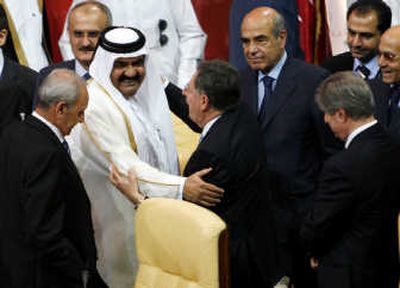Analysis: U.S. absent in peace process

WASHINGTON – Just days after President Bush returned from the Middle East, the Middle East is moving beyond the Bush administration.
Two major peace efforts – a surprise announcement of indirect talks between Israel and Syria brokered by Turkey, and an eleventh-hour deal to prevent a new Lebanese war brokered by Qatar – were launched without an American role, and both counter U.S. strategy in the region.
For years, the Bush administration has resisted overtures from Jerusalem and Damascus to participate in revived peace efforts over the Golan Heights. The administration balked at including Syria in the Annapolis, Md., conference on Middle East peace last year, relenting only under pressure from allies, according to Western officials.
At his Senate confirmation hearing on May 1, James Cunningham, the ambassador-designate to Israel, said expanding peace talks to include Syria would be difficult. “We have taken the position that it is not very useful right now for us to be talking to Syria,” he said. As a result, over the past year Turkey has taken the initiative to launch shuttle diplomacy, a role once reserved for U.S. secretaries of state.
For the past 18 months, the United States has also urged the government of Lebanese Prime Minister Fouad Siniora to resist a new political arrangement that would reflect the shifting balance of power on the ground. Over the past two years, Washington has pledged $1.3 billion in aid, much of it to build up Lebanon’s military.
“The United States wanted the Siniora government to take a harder-line position and hold out against Hezbollah, but it couldn’t provide enough support to make this possible,” said Marina Ottaway of the Carnegie Endowment for International Peace.
To prevent a new war, Qatar stepped in to mediate. The peace deal struck Wednesday favors Hezbollah, the powerful Shiite political party and militia armed by Iran and Syria, which will gain enough new Cabinet seats to veto any decision.
The United States is not playing a role in other critical Middle East initiatives, Ottaway noted, including an Egyptian effort to reconcile the two major Palestinian parties, Fatah and Hamas, and negotiations between Iran and the Gulf Cooperation Council sheikhdoms. The Bush administration is absent “across the board,” she said.
That absence reflects Bush’s lame-duck status, experts said. “The president spoke in Jerusalem a week ago about standing up to dictators and not appeasing those who used force. He isn’t home a week, and the dictators and the forces of violence have triumphed,” said Bruce Riedel, a former National Security Council staff member.
Sen. John Kerry, D-Mass., a member of the Senate Foreign Relations Committee, described as a “wake-up call” the Israeli and Syrian announcement of the first peace effort in eight years. “What did the leaders of Israel, already engaged in negotiations with Syria, think when President Bush stood before the Israeli Knesset and invoked Hitler in labeling engagement with rogue nations ‘appeasement?’ ” he asked.
The administration responded coolly to the news of talks in Istanbul. “We hope that this is a forum to address various concerns we all have with Syria’s support of terrorism, repression of its own people, and so we will see how this progresses,” said White House spokeswoman Dana Perino.